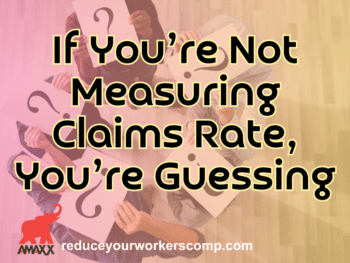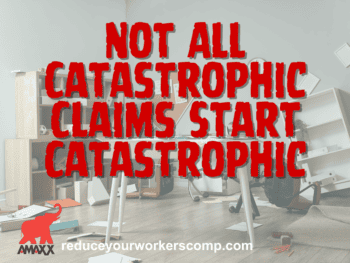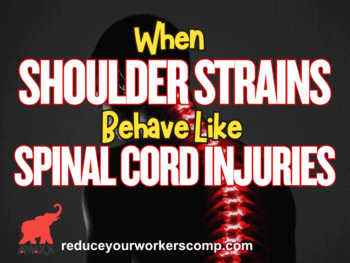
When the underwriter at the insurer looks at calculating your premium, they use what is known as an experience modification factor. This factor is a calculation used to raise or lower your premium based on the loss experience your company has had. If the loss experience has improved, the premium charged to your company goes down. If you have had more claims than before or the claim cost has gone up, your premiums go up.
The loss experience is based on two factors, frequency and severity. The insurance company does not control frequency of claims, your company controls frequency through how well you manage the safety program. As you think back to the previous years, you think “wait a minute, our safety program is working, the number of claims has declined, so why has my premium gone up?” The answer is the other part of the experience modification factor – the severity of the claims.
Click Link to Access Free PDF Download
“How Do I Get My Adjusters To Follow My Account Handling Instructions?”
Claim Cost Not Discounted Due to Poor Handling
There is one thing your insurance broker and your workers compensation insurer will never tell you about the cost of your workers compensation premium. If they do a poor job handling the claims, and spend more money than necessary due to a failure to properly investigate or to return the employees to work, you get to pay for their incompetence. The underwriting department does not discount the severity factor because the claims office did a poor job.
If your next thought is: “I’m no expert on how to handle work comp claims, so how would I know if the claims office is doing a good job? There are ways you as the employer can gauge the effectiveness of the claims office.
Report Claim Immediately
The first thing the employer can do to reduce the severity of the claims is to report them to the claims office immediately. There have been numerous studies that show the longer the delay between the time of the accident and the adjuster contacting the employee, the higher the overall cost of the claim. By reporting the claim to the claims office immediately, you have reduced the amount of time between the accident and the adjuster contacting the employee.
Normally when the adjuster contacts the employee, the adjuster also contacts the employee’s supervisor or manager to verify the facts of the accident. If you have a claims coordinator, have the claims coordinator keep track as to when your company hears back from the work comp adjuster. If you do not have a claims coordinator, have the person who reported the claim to the claims office keep track of when you initially hear back from the adjuster. Same day contact from the claims adjuster is best, next day contact is acceptable.
Sign Adjuster Not Investigating Claims
If your thought is: “We never hear from the adjuster after we report the accident,” that is a major sign that the adjuster is not investigating the claims. If the adjuster is not properly investigating the claims, you as the employer pay for it in your experience modification factor when claims that should be denied are paid, or claims that are fraudulent are paid.
There is a sure-fire way the employer can know if the adjuster was in contact with the employee the day the claim was reported to the claims office (or at least the next day). Pick up the telephone and call the employee. Ask the employee how the initial doctors office visit went and what the doctor thinks the employee’s prognosis will be. Then an “oh, by the way, have you heard from the insurance adjuster yet?” will quickly tell you if the adjuster has made timely contact with the employee. Do this on ten claims in a row and you will soon know if the adjuster is giving your claims the proper initial claims handling. [Bonus – by contacting the employee you show the employee that the employer does care about their well being, which builds rapport with the employee, and diminishes the chances of the employee hiring an attorney].
Lowest Price Often Precludes Service
Another definite tip-off that the adjuster is or is not handling the claims properly is when the adjuster calls your office trying to arrange modified duty so the employee can return to work. If in the initial contact from the adjuster you are asked what light duty assignment you can provide the employee, you have an adjuster who is thinking about how to get the employee back to work, which lowers the amount of indemnity payments and the overall cost (severity) of the claim. A good adjuster will continue to explore light duty return to work until the employee is back at work. A poor adjuster will never ask about light duty return to work and will just pay the employee indemnity benefits until the doctor states the employee is fully recovered. When you bargain for lower-priced TPA or insurance claims adjusting services, consider that you want the adjusters to have the resources to DO this work, and offering the lowest possible price may preclude that – no matter what they say at the official presentation.
An easy way to get your work comp adjuster(s) on the ball in their claim handling is to ask for a copy of their service standards (Best Practices) for workers compensation. Advise the adjuster(s) that you will be reviewing your files to see if they are complying with the Best Practices. If by chance you are told they do not have a set of service standards, it is time for you to talk to your broker about finding another insurance company who is concerned about doing a quality claims handling job.

Author Michael Stack, CEO Amaxx LLC. He is an expert in workers compensation cost containment systems and helps employers reduce their work comp costs by 20% to 50%. He works as a consultant to large and mid-market clients, is co-author of Your Ultimate Guide To Mastering Workers Comp Costs, a comprehensive step-by-step manual of cost containment strategies based on hands-on field experience, and is founder & lead trainer of Amaxx Workers’ Comp Training Center. .
Contact: mstack@reduceyourworkerscomp.com.
Workers’ Comp Roundup Blog: https://blog.reduceyourworkerscomp.com/
©2017 Amaxx LLC. All rights reserved under International Copyright Law.
Do not use this information without independent verification. All state laws vary. You should consult with your insurance broker, attorney, or qualified professional.



























